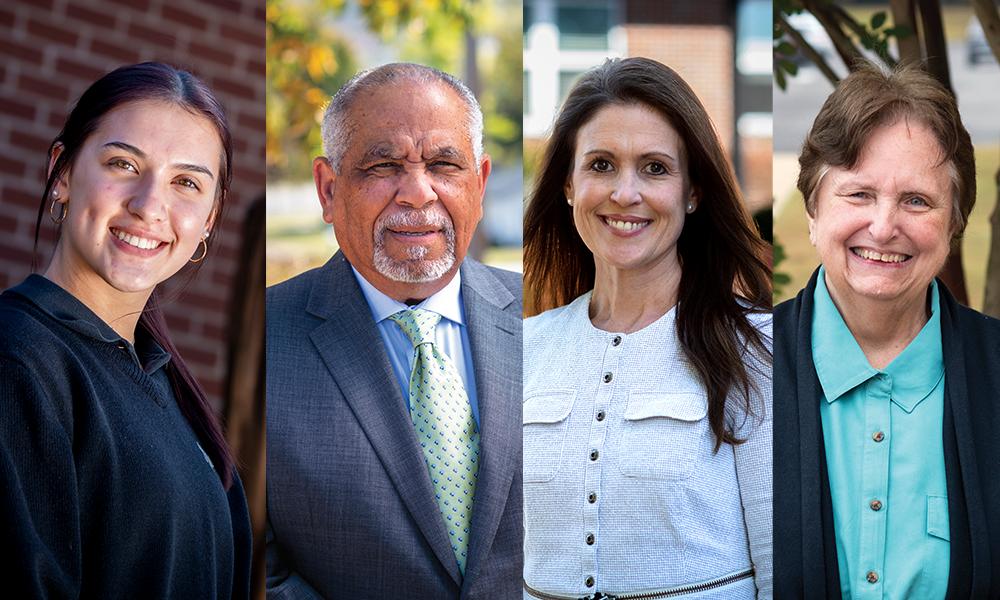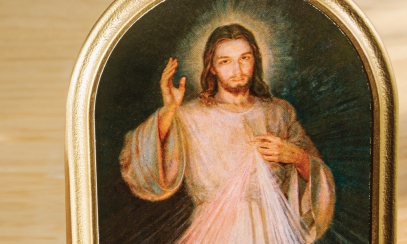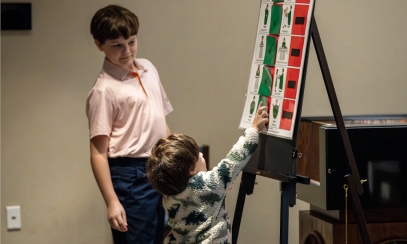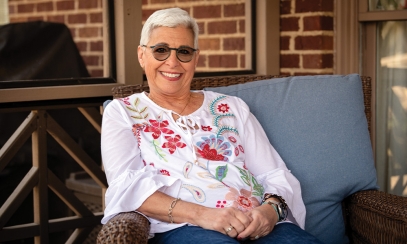
Perspectives
A Student, a Teacher, a Parent, and an Alumnus Talk Catholic Education
A Student, a Teacher, a Parent, and an Alumnus Talk Catholic Education
Student
Bridget Yee
“Everything we do is rooted in the Catholic faith,” says Bridget Yee, a senior at St. John Paul II Catholic High School in Huntsville. Even at the age of 18, she is able to look back at her Catholic education, which started as a kindergartener at St. John the Baptist Catholic School in Madison, and say with certainty, “I’ve never wanted to leave.”
Yee’s appreciation for her education stems from her awareness that having academics, sports, and all extracurricular activities rooted in Christ helps her and her classmates apply faith to all aspects of life, especially relationships. “I think Catholic schools teach us to have relationships with other people in light of our relationship with Jesus,” explains Yee.
For Yee, the relationship with God is a key element to Catholic schools. As a member of the retreat team, she tells her classmates, “You start figuring out who you are in high school. In the end, God is the only One Who truly knows us. If we lose sight of who we are, because it does happen, we just need to talk to God.” Building a relationship with God bears bountiful fruit. She sees students treating each other with respect, but she also sees teachers caring for their students. “They’re not just here doing a job,” she says of her teachers. “I can tell you that they go out of their way to help. They want the students to be the best they can be.”
Striving for excellence is infectious at St. John Paul II Catholic, but true excellence is multifaceted. Yee and her classmates focus on the school’s four pillars: academics, athletics, the arts, and religion. As a member of various groups representing each pillar, Yee realizes that growth in all areas is not only possible but necessary. The growth, however, is best accomplished within the context of a community, and Catholic schools, most certainly, foster community.
For Yee, Catholic education is synonymous with community. Her school community has helped her become the young woman she is today. “When I got to high school, I took all the opportunities I could take. Looking back, I think I’ve definitely grown into the person I am today due to all the experiences I’ve had in class and out of class with teachers and with other students.”
Teacher
Judy Halli
Judy Halli, a long-time teacher at Holy Spirit Catholic School in Tuscaloosa, is a product of 16 years of Catholic education. Growing up in Baltimore, there was never a question. “You went to a Catholic grade school. You went to a Catholic high school, and then you chose a Catholic college.
I never thought twice about it,” Halli remembers.
As a newlywed bride, she left her roots and followed her husband to Tuscaloosa, where he had found a job at the University of Alabama. Holy Spirit’s pastor at the time, Father MacPaul Abraham, heard of Halli’s background and invited her to come be a part of the parish’s school. Early one Saturday morning, she met the priest to tour the school. That was over 50 years ago, and Halli has been associated with the school in some capacity ever since.
“Being with children, especially the span of time that I have, I see God working in them. ... We say to love your neighbor, and we do that. But, as a teacher in a school like this, you have the opportunity to really and truly work with God to change the world.”
Halli takes full advantage of the opportunities presented to her. For Halli, teaching is about not only finding the good in each student and each situation but also looking at the big picture and building relationships. “We’re preparing these students for a future beyond this life.”
Keeping her eyes on the big picture has provided an ever-present feeling of hope. Despite society’s constant focus on all things negative, Halli says she is able to remind each of her students that “God is walking with them.” For her as a teacher, the freedom to bring God into any conversation helps students realize they are made in His image and likeness, which results in great outcomes — the outcomes that matter.
“When we say we are communities of excellence, I think people only think that means academic excellence,” explains Halli. “But excellence is more than just academics or winning the state championship. Excellence is knowing that you have done the best you can, whatever it may be. Excellence is knowing that on Judgement Day, you can say you did the best you could.”
Parent
Cheron White
“Looking back, we wanted to make an investment in our child,” says Cheron White, mom of a seventh grader attending Florence’s St. Joseph Regional Catholic School. The school, which is lovingly referred to as the “Secret on Catholic Hill,” was at the top of the Whites’ list when their only son, Luke, was ready to begin school. After the first tour, the decision for young Luke to attend St. Joseph’s was made. It’s one they never regretted. “It’s a family here,” says White. “I feel like it’s been a true partnership throughout the whole ten years that we’ve been here.”
That partnership has allowed White’s son to flourish at his school. While the academic education he has received has been undoubtedly excellent, White is more impressed with the young man her son is becoming. “I love that he is growing up being able to pray every day in school, to go to Mass, and to go to confession. He knows all of his prayers and is the first to volunteer to be an altar server,” says White proudly.
It is apparent that St. Joseph’s partnership with parents creates a foundation rooted in Christ. The foundation created through Catholic education, especially within the Diocese of Birmingham, helps each child achieve their potential. White has seen her son blossom, and she truly believes having her son at St. Joseph’s has played a major role in his development. “These faculty members go above and beyond for the students,” exclaims White. “There is a [sense of] dedication to faith, knowledge, and service. They care about the students and want them to ... be their very best self.” Catholic educators know that becoming the “best” can only happen when the whole child is developed. Doing so helps foster better disciples of Christ, better students, and better citizens, says White.
As a parent wanting the best for her child, White is not an exception. She sees her son loving his faith and excelling academically, all in a “Christ-centered” environment. The appreciation she has for her son’s school is heartfelt and sincere. “It’s everything and more,” she professes, “than we expected! We thank everyone here from the bottom of our hearts.
Alumnus
Bruce Taylor
Huntsville’s native son Bruce Taylor grew up in what he describes as an “all black neighborhood … an enclave of a mixture of educational and income levels.” Most in his neighborhood were not Catholic, yet when the Salvatorians arrived in 1952 at the request of Archbishop Joseph Toolen, the community welcomed and “embraced” them. Two short years later, when it was time for Taylor to start kindergarten, his non-Catholic parents showed no hesitation enrolling him in St. Joseph Mission School, operated by Sisters of the Divine Savior. “I think they all knew the advantage of a Catholic education,” explains Taylor.
The advantage was far more reaching than academics, however. Although he was not baptized as a child, in his seventh-grade year, Taylor was baptized and confirmed as a Catholic. He says it felt “right,” but many of his classmates didn’t convert to Catholicism. While he and his classmates got a “serious dose of the Baltimore Catechism,” the sisters’ primary goal was to share the love of Christ.
The love of Christ knows no bounds, which taught the young Taylor a major life lesson. Growing up in 1950s Alabama, Taylor says there were only two types of “folks” in Alabama: either you were black or you were white. With segregation still in practice, St. Joseph Mission was a school for black children run by whites, but the mutual respect and dignity shown by students and teachers alike eviscerated any prejudice. “The school was always integrated because the teachers were white. ... They were just regular people.” According to Taylor, when St. Joseph’s accepted 11 white students in September of 1963, it was “fairly uneventful.”
At a time when emotions ran high, St. Joseph’s, under the direction of the Salvatorians, exemplified excellence: the excellence of treating all as children of God.
The school, now referred to as Holy Family Catholic School, and its tradition of excellence drew Taylor back to his roots to give back. Taylor serves as president of the Holy Family School Board, and he and his wife, Helen, serve on the capital campaign to build a new school building. His son, Jeffrey, and daughter-in-law, Maggie, are active participants in the school’s PTO and his three grandchildren, Emma, Lena, and William, attend Holy Family School. “I believe in a Catholic education. I think it builds leadership and a community consciousness. With a Catholic education, you have a high sense of justice and morality. Whether or not the children are Catholic, we want them to be good people.
I don’t want to lose that. I want this school to grow and prosper ... that is how we are going to make a better world!”



